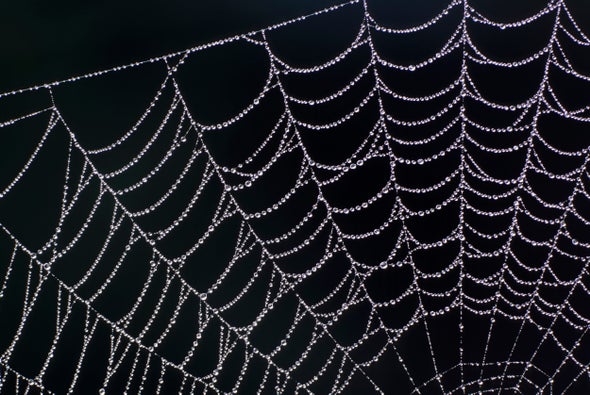
As a lifelong reader of Scientific American, I was tickled to discover a little over a year ago that the magazine had carried poetry in its earliest issues. Volume I, Number 1, for example, dated 28 August 1845, included a poem called “Attraction” that touched on gravity, magnetism and sexual allure. Within a few years, however, the magazine’s original publisher, Rufus Porter, sold Scientific American, and the new owners showed no interest in poetry.
Between the 1840s and the 2010s, poems appeared in the magazine only rarely, most notably in January 1969, when W. H. Auden offered “A New Year Greeting” to “all of you Yeasts, / Bacteria, Viruses, / Aerobics and Anaerobics … for whom my ectoderm is as Middle-Earth to me.” That same issue contained verses from poet and novelist John Updike—verses inspired by his reading of the September 1967 special issue devoted to materials science. “The Dance of the Solids,” with its rhyming references to ceramics, polymers and nonstoichiometric crystals, also appeared in Updike’s collection Midpoint and Other Poems.
“Wouldn’t it be wonderful,” I thought, “to see poetry reinstated in the magazine’s pages on a regular basis?” I posed that question to Clara Moskowitz, senior editor for space and physics, who responded with enthusiasm. Soon other staff members also gave their approval, and managing editor Curtis Brainard came up with the name “Meter” for my proposed new poetry column. It debuted in January 2020, the start of Scientific American’s 175th anniversary year, with a poem by Diane Ackerman about 17th-century scientific illustrator Maria Sibylla Merian.
Diane first introduced me to scientific poetry in the 1970s, when I was science writer in the Cornell University News Bureau and she was a graduate student conferring daily with astronomy professor Carl Sagan to create a cycle of scientifically accurate poems about the solar system. Diane published her collection The Planets: A Cosmic Pastoral in 1976, on the heels of her doctoral dissertation about scientific poetry over the centuries. It seemed fitting to invite her to serve as Meter’s inaugural poet.
The column presents one new (or at least, previously unpublished) poem per month. At the beginning I reached out to a few poets and poets’ friends, and within a short time the column’s existence motivated still more poets to submit their work for consideration. Meter’s first year of poems treated a gratifying variety of science fields, from mathematics and mycology to astronomy, geology, pathology, physics, chemistry and climate change. Meter poets to date include a Pulitzer Prize–winner in poetry, a Nobel Prize–winner in physics, and the current National Poet Laureate of the U.K. As many women as men have been featured, some well-known and some just becoming so.
Many technical terms—entanglement, relativity, quantum leap—reach across the artificial divide between science and art to capture the poetic imagination. Often in general literature a poet who refers to such ideas will do so only in passing, and only for the sake of metaphor. In contrast, the poets who compose for Meter actually grapple with the concepts. Or they peer into the mind of a scientist at work. Or they are scientists themselves, thinking things through in an alternate mindset.
To make Meter equally rich and varied in 2021 and years to come, poets with a love of science are encouraged to submit new work to dsobel@sciam.com. I try to respond quickly and honestly. And kindly. Having received my share of rejection letters over the years, I take the writing of them very much to heart.
A full—and fully illustrated—page per month may seem like a lot of poetry for a science magazine, but it’s too small a space to incorporate the flow of poems reaching my desk now, let alone the anticipated bounty from a widening international circle of poets conversant with science. We editors are already dreaming of a Scientific American Anthology of Poetry.
"What" - Google News
December 23, 2020 at 11:00PM
https://ift.tt/3ph2bzi
Nature in Verse: What Poetry Reveals about Science - Scientific American
"What" - Google News
https://ift.tt/3aVokM1
https://ift.tt/2Wij67R
Bagikan Berita Ini














0 Response to "Nature in Verse: What Poetry Reveals about Science - Scientific American"
Post a Comment